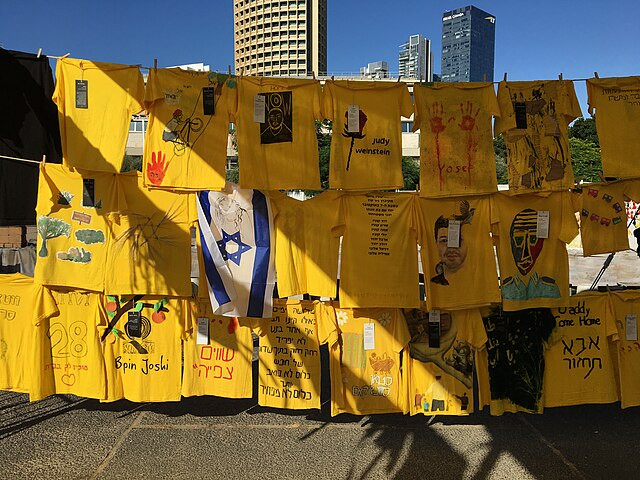Hamas freed three Israeli hostages on Saturday in exchange for more than 300 Palestinian prisoners, as part of the ongoing ceasefire agreement with Israel. The release follows a week of heightened tensions that threatened to derail the fragile truce.
The hostages-Alexander (Sasha) Troufanov, 29, an Israeli-Russian dual citizen; Sagui Dekel-Chen, 36, a dual U.S.-Israeli citizen; and Iair Horn, 46, an Israeli-Argentine citizen-were taken hostage during Hamas's October 7, 2023, attack on Israel. The three men were kidnapped from Kibbutz Nir Oz and had been held in captivity for nearly 500 days.
The Israeli military confirmed their release, stating that the hostages were transferred to the Red Cross before crossing into Israeli territory. "A short while ago, accompanied by IDF and ISA forces, the returning hostages crossed the border into Israeli territory," the Israel Defense Forces said in a statement. "The returning hostages are currently on their way to an initial reception point in southern Israel, where they will be reunited with members of their families."
Israeli Prime Minister Benjamin Netanyahu's office also confirmed their return, stating, "Today, three of our hostages have been returned to Israel: Yair Horn, Alexander (Sasha) Trufanov, and Sagui Dekel-Chen. We welcome them with a warm hug. We have prepared for their return and, together with their families, will support their recovery after the long and agonizing days in captivity."
As part of the exchange, 369 Palestinian prisoners were released from Israeli detention. Of those, 36 were sent to the occupied West Bank, with 24 exiled to Egypt. Six buses carrying 333 Palestinian detainees entered Gaza through the Kerem Shalom border crossing into Rafah, where large crowds awaited their arrival. Some of the released prisoners were reportedly ordered to wear uniforms provided by the Israeli Prison Service, which had "We will not forget, and we will not forgive" inscribed next to a Star of David. The move sparked outrage among Palestinian groups, including Hamas and Islamic Jihad, who condemned it as a "flagrant violation of all international and humanitarian laws." Videos later emerged showing detainees burning the uniforms.
The exchange proceeded despite a dispute earlier in the week when Hamas accused Israel of failing to meet ceasefire conditions, citing insufficient deliveries of shelters, medical supplies, fuel, and heavy equipment for clearing rubble. Hamas briefly threatened to delay the release, but Israeli officials warned that the military would resume operations if hostages were not freed on schedule.
Netanyahu's office blamed Hamas for attempting to derail the agreement, stating, "This week, Hamas once again attempted to violate the agreement and create a fabricated crisis with false claims. Thanks to the deployment of our forces inside and around the Gaza Strip, and due to President Trump's clear and unequivocal statement, Hamas backed down, and the hostage release continued."
About 70 hostages remain in Hamas custody. Most of the remaining hostages are Israeli soldiers, and at least half are believed to be dead. The first phase of the ceasefire has so far led to the release of 24 hostages and over 1,000 Palestinian prisoners. Under the agreement, Hamas is expected to free a total of 33 Israeli hostages in exchange for nearly 2,000 Palestinian detainees.
The war, which began with Hamas's attack on October 7, has killed more than 1,200 Israelis. The subsequent Israeli bombardment of Gaza has resulted in over 48,000 Palestinian casualties, according to the Hamas-run Ministry of Health.




